- Home
- Patrick E. Andrews
The Dragoons 3 Page 2
The Dragoons 3 Read online
Page 2
“I see they are not martinets who love to prance about in fancy uniforms,” Eruditus remarked.
“Like any veteran of the frontier, each man knows enough to be practical in his choice of dress,” Drummond said. “That lesson also applied to the late conflict in which we served.” The war between the United States and Mexico had come to an end a few scant months before. America was the victor and had acquired vast new territories, among them New Mexico, Arizona, and California. The need for regular contact between the rest of the nation and the Pacific Coast made the establishment of communication lines across that particular area of the Vano Basin of utmost importance. Another consideration was the protection of the many travelers headed for the newly discovered gold fields of California. It had become the job of the United States Army—and the dragoons in particular—to provide that lifesaving service. One of the first units assigned to the job was that very detachment under the command of Captain Grant Drummond. He had the responsibility of the Vano Basin along the Mexican border. Eruditus Fletcher had been contracted by headquarters in Santa Fe, New Mexico Territory to serve the detachment as its scout, guide, and interpreter in whatever demands their duties put upon them.
“Have you found a camp for us, Mr. Fletcher?” Captain Drummond inquired.
“Indeed, sir,” Eruditus assured him. “Roughly ten miles from here there is a spot at the base of the Culebra Mountains that offers shade, water, and natural fortification.”
“I suggest we proceed there at once,” Drummond said. “We’re weary and are in dire need of settling down to recover. Our horses, too, require rest.”
“I am at your service, sir,” Eruditus said. “We shall ride in a northwesterly direction.”
The column resumed its journey with Eruditus easing them into the correct path across the trackless waste of the Vano Basin. In a bit more than two hours they reached the rocky outcrops of the Culebra Mountain’s foothills. The old man took the dragoons through a barely discernible trail across a stone-strewn slope, that finally eased down to a spot where a wall of solid rock rose from the earth. A small column of water cascaded down from the heights above, ending its plunge in a vapory collision with a small pool.
Eruditus gestured at the scene before them. “This, Captain Drummond, is the spot I’ve chosen for our praesidium, as Julius Caesar might say.”
Drummond smiled. “I would think that Caesar would be more inclined to describe this place as a castra—a camp—rather than a garrison, Mr. Fletcher.”
Eruditus chuckled. “I believe you are correct, Captain.” Drummond gave the area a quick look-around. “I would like to be able to truthfully utter Caesar’s words of Veni, vidi, vici—I came, I saw, I conquered. However, at this moment I have no feelings as a conqueror.”
“Perhaps you feel as I do at times in this wild and wonderful territory,” Eruditus said. “Frequently I perceive myself and other humans as interlopers.”
“Those may be the sensations I am experiencing,” Drummond admitted.
“At any rate, sir, this is your command,” Eruditus pointed out.
“And it has everything we need,” Drummond said. “You described it well.”
“The water there is cold and sweet,” Eruditus said. “It arrives to us from the Culebra Mountains that tower above our new home.”
“We’ll investigate the quality of that pool as quickly as possible,” Drummond said. He turned toward his men and barked, “Sergeant Clooney!”
Sergeant William Clooney rode forward and reported with a salute. “Yes, sir?”
Drummond motioned to Eruditus. “This is our contract scout Mr. Eruditus Fletcher. Mr. Fletcher, this is Sergeant William Clooney. If I am the tribune of this legion, then the sergeant is the centurion.”
“A pleasure, Sergeant,” Eruditus said as the two shook hands.
“Take charge of the detachment and set up camp, Sergeant,” Drummond said. “We have arrived.”
“Yes, sir,” Clooney said. “Where’d you like your tent, Cap’n?”
“Right in the center, Sergeant,” Drummond said. “And have the men pitch their own between mine and the water. We’ll use the open space up here as our parade ground.” Clooney, an old soldier with fifteen years in the ranks, gave the place a quick, professional inspection. “I think we ought to put up rifle pits and rocks along here, sir. It’d make a dandy defensive line.”
“Now I do feel the interloper,” Eruditus said.
“So do I, but my centurion is absolutely correct,” Drummond said. “Carry on, Sergeant.”
“Yes, sir!” Clooney turned to Eruditus. “You’ll be bunking with me in our own tent, Mr. Fletcher.”
“I prefer to sleep out under the stars,” Eruditus said.
“Suit yourself,” the sergeant said. He went off to tend to his duties.
Drummond and Eruditus dismounted and walked over to the shade cast by the mountain wall. “The drainage here seems adequate,” the major remarked.
“I guarantee it is, sir,” Eruditus said. “Even in the event of the rare cloudburst, this camp will not have standing water.”
“That does not happen often then?” Drummond asked. “You can thank God for that,” Eruditus said seriously. “This terrain cannot soak up water. Instead it remains on top and rushes about in torrential flash flooding that is deadly to man and beast alike.”
A soldier quickly appeared with a couple of camp chairs, then scurried back to join the other work details. Drummond sat down on one, while Eruditus, ignoring the other, plopped his skinny buttocks down on the ground.
Drummond lit a pipe and gave the scout a long gaze of unabashed curiosity. He spoke frankly, saying, “So! Just who the hell are you, Mr. Fletcher?”
Eruditus grinned as he lit up his own smoke in the form of a Mexican cigar. “I am not surprised by your curiosity, Captain Drummond. My appearance and my conduct are of two different worlds.”
“Obviously,” Drummond said. “Please enlighten me, Mr. Fletcher, if I am not becoming too personal.”
“I entered this unhappy world not far from this spot in the year of 1793,” Eruditus said. “My father was an English sea captain who was shipwrecked off the coast of east Mexico. He was fortunate enough to be able to lead his intrepid crew ashore to safety. This was near the city of Tampico where a small enclave of English people were established.”
Drummond puffed on his pipe. “Please tell me what would attract Englishmen to that dreary spot.”
“Commerce, Captain,” Eruditus said. “They had set up a trading post, complete with tea in the afternoon, of course, to deal with goods from the interior of Mexico. My father saw some monetary advantage to becoming a part of the establishment, and so took advantage of an invitation to join in their efforts.”
Drummond closely studied Eruditus’ face. “Now don’t tell me he married a local lady, Mr. Fletcher. You haven’t the slightest cast of Mexico in your features.”
Eruditus chuckled. “He wed an English lady—widow, as a matter of fact—who would become my mother. Her husband had died a year earlier and she hadn’t the opportunity to return to Mother England by the time my father made his own unplanned and thoroughly wet arrival upon the scene.”
“I presume your parents ended up this far west if you were born here,” Drummond said.
“Of course,” Eruditus said. “Sailor men are natural wanderers and filled with curiosity about the next port of call, or what is on the other side of the mountain if they are ashore. My father wanted to see Mexico. He brought my mother along on his wanderings and ended up in the cattle business in Sonora south of here. That is where I was born and raised, including much time here on the Vano Basin and in the Culebra Mountains.”
Drummond nodded knowingly. “I assume he sent you East for an education as a boy.”
“That he did, sir,” Eruditus said. “I would have received my degree and gone on for a doctorate of philosophy and letters, but bad luck in the guise of bandits took away my parents, their propert
y, and my schooling. Thus, because of other men’s evil, I was forced to return here.”
“Too bad,” Drummond said.
“Au contraire!” Eruditus exclaimed. “This is the scene of my boyhood. Any misgivings I felt were swept away in the grandeur and beauty of this, mine own land.”
“Then you know every nook and cranny of the Vano Basin and these mountains, Mr. Fletcher?” Drummond asked.
“I do, Captain,” Eruditus assured him. “And the people who live here as well “
“Are they agreeable and friendly?” Drummond asked. “Alas!” Eruditus exclaimed. “They are human beings.”
“You are telling me we will face savagery and murder in this quiet, barren land?” Drummond asked.
As an answer, Eruditus did what he liked to do best—quote poetry. This time he chose words from the English poet William Blake:
“Cruelty has a human heart,
And jealousy a human face;
Terror the human form divine,
And secrecy the human dress.”
Drummond knocked the tobacco from his pipe. “You make the duty of pacifying this country sound like an impossible task, Mr. Fletcher.”
“I’m not saying it is impossible, sir,” Eruditus assured him. “But in order to make peace, often men must die. Both good and bad.”
Drummond glanced around. “Yes,” he said once again feeling a soldier’s excitement at being in a new, unknown area that offered excitement. “This is going to be one hell of a job.”
Two
The two spying Apache warriors, hidden from the view of those they observed, did not have to worry about making noise. Any sounds that resulted from them moving around or rustling vegetation were covered by the waters of the small stream rushing past their position. From their viewing spot the water arched out into empty air to fall a hundred feet down to the pool below where the white men they spied upon were situated. The Indians called the small body of water the Pool-Beneath-the-Cliff.
The name of the Indian leaning the farthest out over the edge was Quintero. He was short, very muscular, and so dark his skin color could be described as mahogany. Quintero was very much admired in his age group of males within his clan. Smart, aggressive, and fearless, he had evolved into a natural leader since his entrance into warriorhood. As was his habit, Quintero carried a flintlock rifle he had taken from a Mexican vaquero killed in a cattle-stealing raid less than a year previously.
Looking down from his concealed observation post, the Apache fighter did not like what he saw. Quintero spat at those he considered interlopers into his people’s land.
His best friend, a warrior called Chaparro, glanced across the stream, and studied the scowl on his companion’s face.
He was pleased at the hatred he could see. Quintero’s anger always meant excitement. Chaparro glanced down, but his eyesight at distances was poor, and he was unable to make out much of what went on below. He turned back from the view and walked to the spot where their horses were tied to some scrub pine trees. Chaparro squatted down on his haunches to wait for Quintero to finish watching the men below.
The sun moved an eighth of a way across the sky before Quintero pulled back from the edge and joined Chaparro. He was so furious he could not speak. He stood there slapping the stock of his rifle with loud smacks of his hand as he considered what he had seen.
“Are they Mexicanos, Quintero?” Chaparro asked.
“They are White-Eyes,” Quintero said. “One of them is the old man Erudito.” That Spanish word was the closest the Apaches could come to pronouncing Eruditus’ name.
“The friend of old Aguila?” Chaparro mused. “What is he doing? Bringing White-Eyes into El Vano to live with him?” The Apaches called the Vano Basin “El Vano,” the same as the Mexicans.
“I do not know,” Quintero said. “I have always fought to keep the Mexicanos out of El Vano.” It was typical of the young man to refer to himself alone and no others when speaking of past events. “Now it looks like I must fight White-Eyes as well.”
“Maybe they are not going to stay long,” Chaparro suggested. “I cannot see well at that distance, but it seems the wickiups they erect are of cloth, not of adobe or wood.”
“It makes no difference. White-Eyes and Mexicanos are the same,” Quintero told him. “They like to call land their own and live on it without ever going away. It does not matter what sort of lodges they put up. They will build stronger ones later.”
“Perhaps these new people have cattle with them,” Chaparro remarked hopefully. “We can use the meat.”
“They are not building a rancho down there,” Quintero said. “Those men are soldiers. White-Eye soldiers are like Mexicano soldiers. They are paid to fight. We will have to make war against them.”
“But if Erudito brought them in, then Aguila will not want us to fight them,” Chaparro pointed out. “He will speak against making war at the council.”
“Aguila is an old man like Erudito!” Quintero spat. “Instead of meddling in matters concerning younger people, those two should be sitting somewhere getting drunk together on mescal or tequila and stay out of the way.”
“True,” Chaparro agreed. “It would be a natural thing for them to do. They are good friends, no?”
“Did you not know they were boys together in days even before our own fathers were born?” Quintero said.
“That makes a strong friendship,” Chaparro said. “We spent our boyhood as friends. Now we are grown warriors and are like brothers.”
“Our friendship is strong,” Quintero said. “But I tell you this, Chaparro. If you ever brought in White-Eyes or Mexicanos into El Vano, I would kill you even if I do love you as a brother.”
“Then I will not do that,” Chaparro said seriously. “You are a stronger warrior than I.”
“I am also a stronger warrior than Aguila,” Quintero said.
“You would fight him?” Chaparro chided him. “He is not young and does not go to hunt or fight, yet he is listened to on the council.”
“The day is coming when they will listen to me!” Quintero said. “Come! Let us return to the village and talk to our friends.”
Chaparro, knowing that it wouldn’t be long before Quintero stirred up some excitement and bloodletting, happily swung up on the back of his horse.
The two warriors were members of a mountain and desert Apache tribe called the Chirinatos. Fierce warriors and relentless hunters, that particular clan was both respected and feared by other Indians and Mexicans in the area. Although they principally inhabited the Culebra Mountains, the tribe’s beginnings were on the great desert of the Vano Basin that stretched out from that forested, craggy range. Because of those early days, they sometimes felt drawn back to the hard-packed sandy terrain of the arid, harsh land their ancestors had roamed. To them, the area held many sacred and deeply spiritual qualities. Because of this, bands of Chirinatos would spend months wandering and living in one of the most merciless lands on earth.
Although prone to break up into small groups, this Indian clan could gather together in a very short time in cases of emergencies. Most of the time the men hunted, fought other Indians, and stole what they could from Mexicans during forays south. The women were homebound with their own duties and pastimes. They gathered food such as cactus fruit and yucca stems on the desert, or nuts and berries when up in the high country. Although the Chirinato females planted small crops of corn and squash from time to time, wandering from mountain to desert and back again did not give much opportunity for any serious agricultural undertaking.
The band to which Quintero and Chaparro belonged were presently residing in a camp in the Culebra Mountains. The pair urged their mounts upward into the higher reaches of the range. In only a half hour of travel, the weather cooled and the vegetation went from scrawny chaparral to stubby trees. In another thirty minutes, the trees had thickened until the Apaches’ horses threaded through a veritable forest of pine and evergreen.
They found the vi
llage’s wickiups strung along a shallow mountain valley with a stream running through it. It was that same ribbon of water that ran down through the mountains to pour off the cliff into the pool on the desert floor. They went directly to a far corner of the area where four of the lodges were pitched close together. Quintero and Chaparro liked to stay near their other two friends, who were a couple of warriors as fond of fighting as they. Their names were Bistozo and Zalea.
Bistozo, noting his comrades’ arrival, looked up from his chore of cleaning the bore of his musket with a brass ramrod. He raised his hand in greeting, then noted Quintero’s furious expression. Quickly getting to his feet, he approached them. “What has happened?”
Chaparro answered. “We have seen White-Eyes at the Pool-Beneath-the-Cliff. They were with Erudito.”
Bistozo was interested. “What were they doing?”
“The White-Eyes had set up cloth wickiups,” Chaparro answered.
“Are you sure they were not Mexicanos?” Bistozo inquired. Quintero finally spoke. “I saw yellow hair among them and very light skin. These are men of Erudito’s race. Of this there is no doubt.”
Bistozo was curious. He knew that Quintero could not tolerate outsiders in El Vano. “What do you want to do, Quintero?”
Chaparro laughed. “He wants to kill them.”
Bistozo now grinned. “Then let us go do this thing.” Chaparro shook his head. “No! The council has already warned us about making war after we killed the White-Eye family last year.”
Bistozo nodded. “Aguila said.
“I don’t care what that old grizzly bear says!” Quintero interrupted. “I will pay him no mind.”
“But he speaks wisely,” Bistozo argued. “He said the White-Eyes were lost and confused, so nobody knew they were here. If they did, then the family would have been missed. In that case the soldiers would have come to punish us. He said our people were lucky for all that.”
“If you think Aguila gives wise counsel, why don’t you stay by him?” Quintero asked.

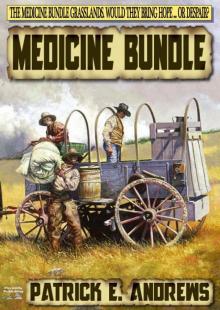 Medicine Bundle
Medicine Bundle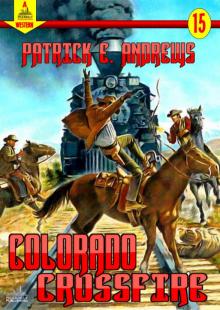 Colorado Crossfire
Colorado Crossfire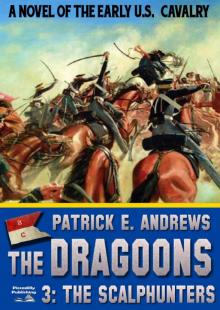 The Dragoons 3
The Dragoons 3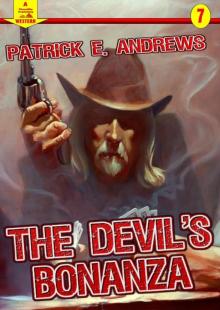 The Devil's Bonanza (A Piccadilly Publishing Western Book
The Devil's Bonanza (A Piccadilly Publishing Western Book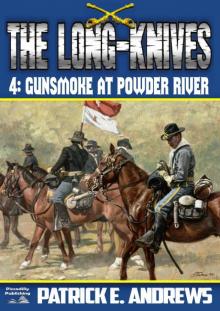 Gunsmoke at Powder River (The Long-Knives #4)
Gunsmoke at Powder River (The Long-Knives #4)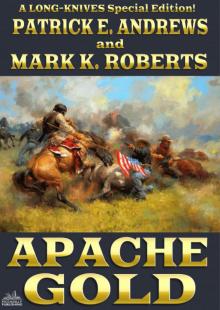 The Long-Knives 6
The Long-Knives 6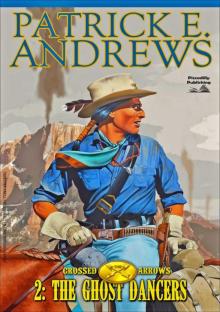 The Ghost Dancers (A Crossed Arrows Western Book 2)
The Ghost Dancers (A Crossed Arrows Western Book 2)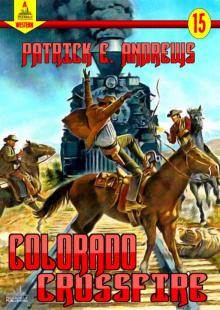 Colorado Crossfire (A Piccadilly Pulishing Western Book 15)
Colorado Crossfire (A Piccadilly Pulishing Western Book 15)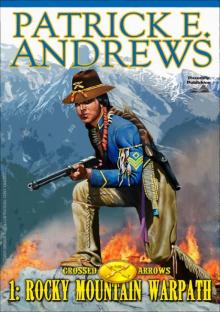 Rocky Mountain Warpath (A Crossed Arrows Western Book 1)
Rocky Mountain Warpath (A Crossed Arrows Western Book 1)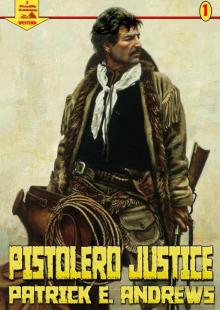 Pistolero Justice (A Piccadilly Publishing Western
Pistolero Justice (A Piccadilly Publishing Western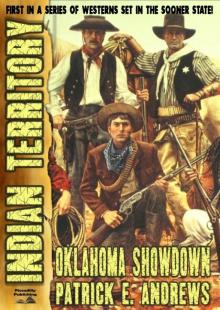 Oklahoma Showdown (An Indian Territory Western Book 1)
Oklahoma Showdown (An Indian Territory Western Book 1)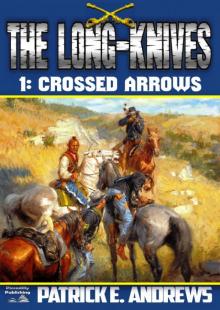 Crossed Arrows (A Long-Knives Western Book 1)
Crossed Arrows (A Long-Knives Western Book 1)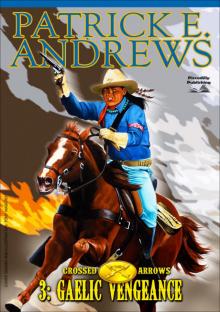 Crossed Arrows 3
Crossed Arrows 3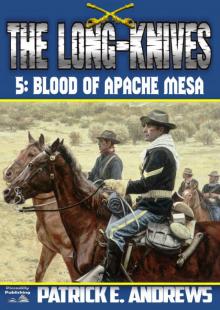 Blood of Apache Mesa
Blood of Apache Mesa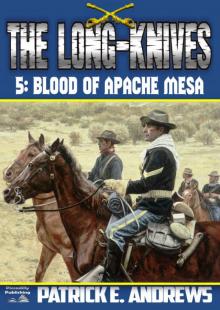 The Long-Knives 5
The Long-Knives 5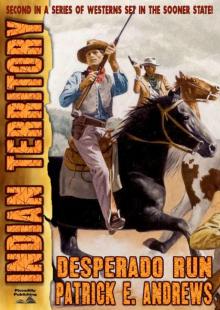 Desperado Run (An Indian Territory Western Book 2)
Desperado Run (An Indian Territory Western Book 2)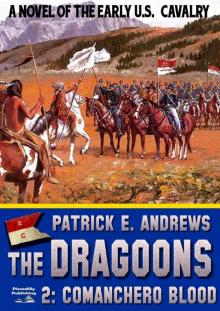 Comanchero Blood (A Dragoons Western Book 2)
Comanchero Blood (A Dragoons Western Book 2)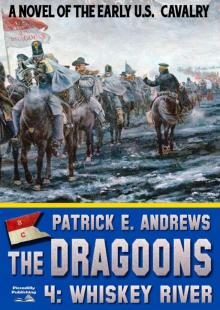 The Dragoons 4
The Dragoons 4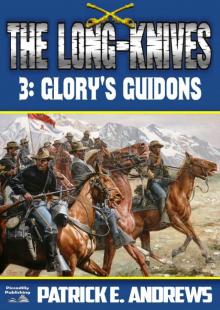 Glory's Guidons (The Long-Knives US Cavalry Western Book 3)
Glory's Guidons (The Long-Knives US Cavalry Western Book 3)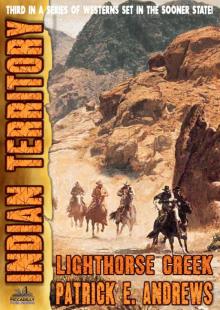 Indian Territory 3
Indian Territory 3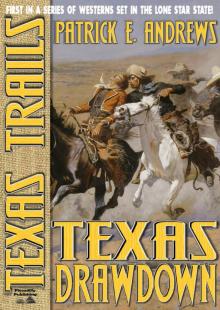 Texas Trails 1
Texas Trails 1